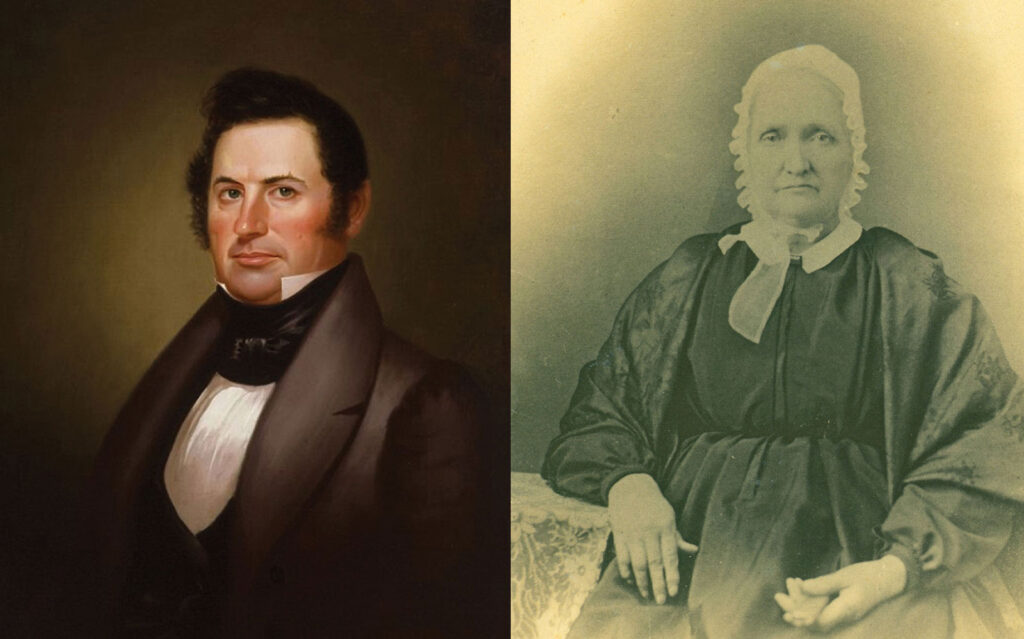Let’s meet Richard and Ann Hawkins Gentry, a pioneering couple whose union changed the history of Columbia and Missouri forever. If you’ve driven through Gentry County or attended Ann Hawkins Gentry Middle School here in town, you’ve witnessed their legacy for yourself.
Although they were founders of Columbia, their story started further east, in Madison County, Kentucky, where they were married in 1810. Ann, born in 1791, was the daughter of a Revolutionary War veteran and she married a military man; Richard, born in 1788, was a lieutenant in the Kentucky State Militia. His career meant he often spent time away from their growing family, which left Ann to take care of their farm and children alone, a recurring theme throughout their life together.
At the time, it was common for families to strike out west to seek their fortunes in the frontiers of the American prairies, and the Gentrys felt the westward call just like so many others. When Richard’s brother Reuben bought land in today’s Boone County, they soon followed him out to St. Louis. Ann made the journey on a thoroughbred racing mare, cradling her newborn daughter, Dorothy Ann, in her lap.
After a brief stay in Franklin, Missouri, that ended with Richard fatally shooting the local registrar (he was cleared of all charges despite multiple eyewitnesses) and a stint in the now defunct Smithton, the Gentrys finally became some of the first settlers of Columbia in 1821. A brand new town, its citizens lived clustered around what is now the downtown area, the location carefully chosen because of the freshwater springs in the area.
The Gentrys quickly became the heart of the town. Richard opened a tavern off of Broadway and built his farm and stables on the corner of Seventh and Cherry. He also became an important figure in Columbia’s burgeoning political scene. He was elected the town’s first mayor the year it was founded, a Missouri State Senator in 1826, and Columbia’s postmaster in 1830. When overland trade business kept Richard away, Ann helped out with the office on top of running the farm and the tavern.
Sadly, his career ended their life together as well. After being promoted to major general in the Missouri State Militia, Richard fought against the Seminole down in the swamps of Florida. Under the command of future U.S President Zachary Taylor, Richard was killed in action in 1835 in the Battle of Lake Okeechobee and buried in St. Louis. Upon hearing of his death, Ann famously declared that she’d rather be a “brave man’s widow than a coward’s wife.”
As a widow, Ann continued to be influential in the community. Her appointment as Columbia’s first female postmistress in 1838 made history, as she was only the second woman allowed the post in the country. Senator Thomas Hart Benton squashed complaints of her appointment by saying: “The time is coming, sirs, when women will exert as much influence in politics as men. The fact that she is a woman is no reason she should not be appointed.”
Benton’s prediction turned out to be correct. Ann served as postmistress for the next few decades, until 1865, running the post office and the family tavern in a building on Ninth Street. Ann continued to raise her children — nine of 13 survived to adulthood, and she even raised a grandchild after her daughter Martha died in childbirth. When Ann died in 1870, she left an estate of $20,000 to her family, continuing to care for them even in death. She was buried in Columbia Cemetery.
Although this couple lived over a century ago, their mark can still be seen in the city and state today. Their work ethic and perseverance not only built a town, but a community, and the work they completed during their lifetimes will be evident for many more.










